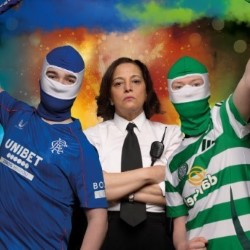No Comments
Singin' I'm No a Billy Jr, He's a Tim Jr – Young Offenders 4**** - One4Review
one4review | On 17, Aug 2025
Before a single line is spoken, the tone is set like a derby day kick-off. Rob McLean and David Tanner appear on screen like Sky Sports pundits, parsing the stats and stakes of the evening ahead. Frankie Goes to Hollywood’s Two Tribes blares over the PA, underscoring the sense that what we’re about to witness isn’t merely a play — it’s a match, a clash of colours, culture, and belonging, one where the referee’s whistle might never truly blow.
The action unfolds inside a police holding cell — stark, functional, a crucible for conflict. First through the door is Tim, a Celtic fan with a razor tongue and a knack for trouble, enough to land him in limbo just hours before an Old Firm clash.
Enter Billy: Rangers to the bone, a grand down, shoulders back, chin raised, swaggering like he owns the joint. The walk, the gallus, the cock-sure snarl — it’s all there, a performance of masculinity as much as fandom. Sparks don’t just fly; they ignite. The cell becomes less a waiting room and more a pressure cooker.
Des Dillon’s script is sharp as ever — funny, raw, and unflinching. The dialogue ricochets between humour and history: shipyards, the potato famine, the Orange Lodge, class, religion, Scotland versus England, even the broader question of what it means to be Scottish or Irish at all. The sectarian taunts feel authentic and ugly, but they also open onto something larger. The chanting of one tribe shades into the chanting of another — integration, migration, belonging. The unspoken question hums beneath the surface: who gets to belong, and on what terms?
What’s most striking is how the bile and bravado gradually reveal something else. As the tight 75 minutes tick by, these two lads — who at first seem like immovable objects destined to clash forever — begin to show the cracks in their armour. Beneath the slogans and scarf colours lies a shared humanity: family ties, illness, money worries, and the absurdity of tribal hatred. The comedy is never lost, but it’s deepened by the recognition that the feud is ultimately a performance, one they’ve both inherited rather than chosen.
The performances are a revelation. Sir Matt Busby once said: “If you’re good enough, you’re old enough.” On this evidence, Archie McCormick (Tim) and Kai Bruce (Billy) are very good indeed. McCormick resists caricature, giving Tim wit, bite, and vulnerability in equal measure. Bruce channels early Ray Winstone in his aggression and swagger — a volatile mix of threat and charm. That both are just 15 years old is extraordinary; they carry the stage with the kind of assurance usually honed over years. It speaks volumes about the talent coming through Rutherglen’s Performance Academy, which seems less like a training ground and more like a proving ground for fearless young artists.
James Miller, as Harry the officer, adds ballast — the weary authority figure, the referee who cannot stop the game from spilling out around him. He gives the production a grounding note of realism, reminding us this isn’t just a sparring match between two lads but part of a wider system of discipline and control.
By the final stretch, the insults slow, the voices lower, and the play itself seems to exhale. There’s a quiet recognition that the match, like all matches, will end — and that life, in all its messy contradictions, will go on afterwards
This Young Offenders edition doesn’t just revive Des Dillon’s modern Scottish classic — it reframes it. It’s still funny, still barbed, still provocative. But in the mouths of younger actors, the themes feel renewed, almost sharper, as though seen through the lens of a new generation who have inherited these divisions but not necessarily chosen them. There’s even an argument to be made that this version is tighter, leaner, and in places more affecting than the original.
And when the final whistle blows, the larger truth hangs in the air: maybe, just maybe, common ground is possible. Rivalries can’t be erased, but dialogue can shift them, soften them, complicate them. It’s a lesson that reaches far beyond football, one that feels eerily familiar in a world perpetually divided into teams, tribes, and camps. The play’s sting lies not in the bile of its banter but in the possibility that, in the end, the opposition might not be an enemy but a neighbour.
****
Reviewed by Steve H
Venue Pleasance EICC
Time 20.00
Until 24th Aug.
















Submit a Comment